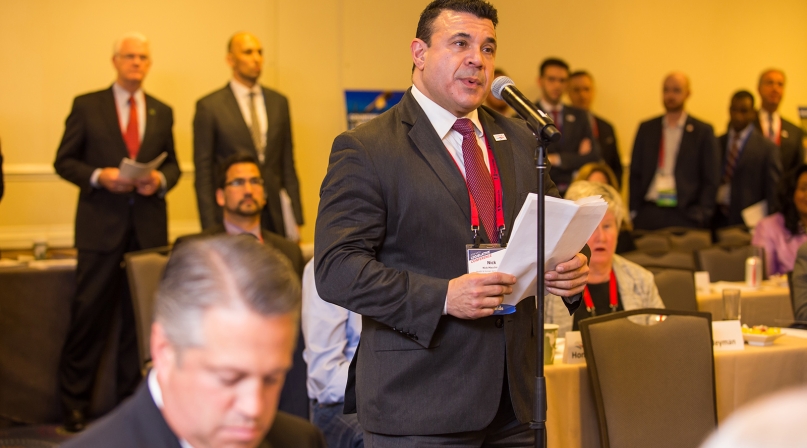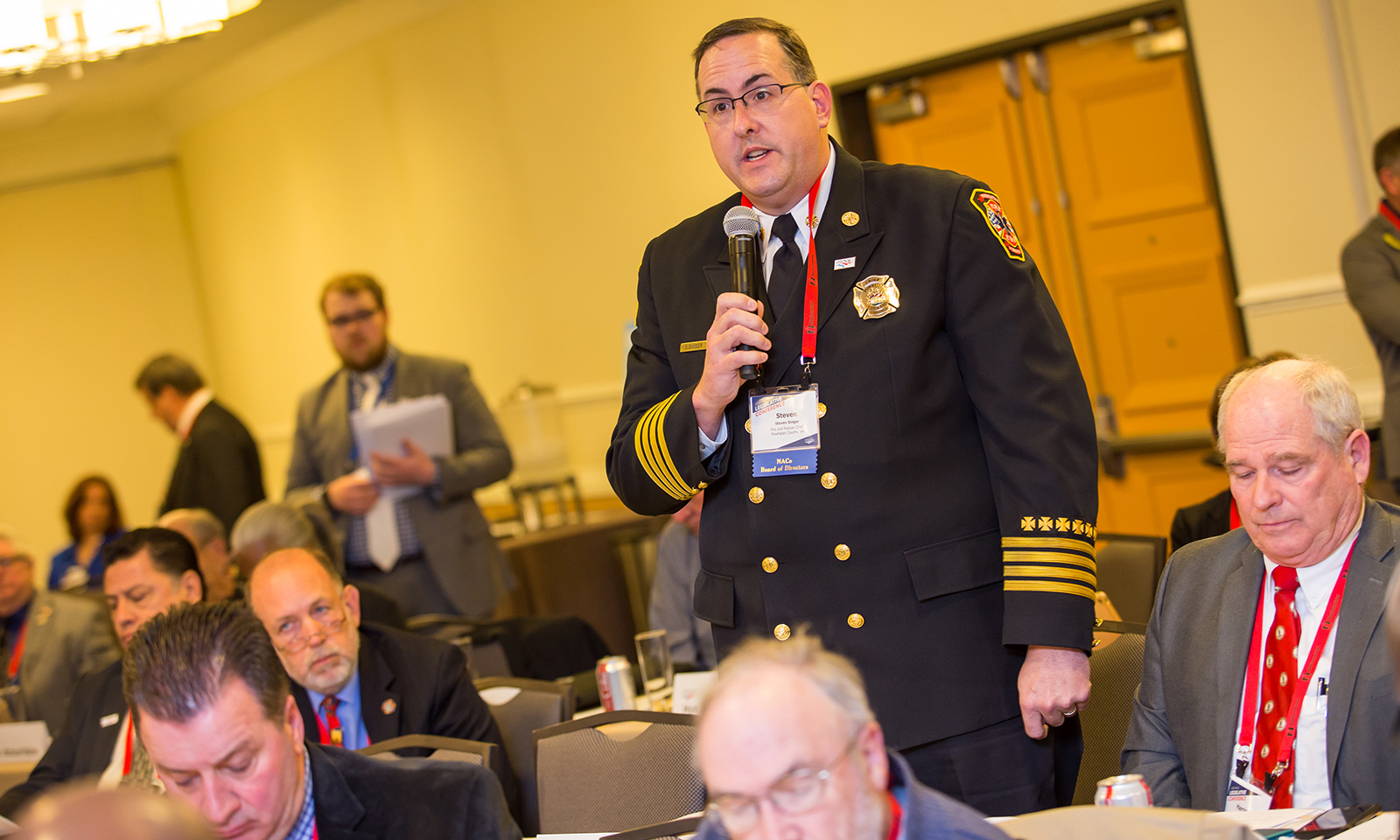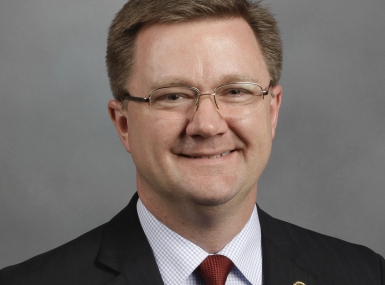Board adopts new policy on issues ranging from affordable housing to election security
Upcoming Events
Related News

NACo’s Board of Directors approved 20 interim policy resolutions at the Legislative Conference in Washington, D.C. These interim policy resolutions will supplement existing NACo policy until NACo’s 2018 Annual Conference.
COMMUNITY, ECONOMIC AND WORKFORCE DEVELOPMENT
FY2019 Appropriations for the U.S. Department of Housing and Urban Development
Issue: Support FY 2019 Appropriations for the U.S. Department of Housing and Urban Development (HUD).
Adopted Policy: The National Association of Counties (NACo) urges Congress to support the following levels of funding for core U.S. Department of Housing and Urban Development (HUD) programs in the FY 2019 Transportation, Housing and Urban Development and Related Agencies Appropriations bill: no less than $3.3 billion in Community Development Block Grant (CDBG) formula funding; no less than $1.2 billion in formula funding for the HOME Investment Partnerships Program (HOME); no less than $2.6 billion for Homeless Assistance grants, including at least $270 million for the Emergency Solutions Grant program plus an amount to fully fund expiring supportive housing and Shelter Plus Care rent subsidy contracts; full funding for existing Section 8 project-based and tenant-based contracts; $70 million for HUD-VASH and $500 million in Section 108 Loan Guarantee authority.
Additionally, NACo opposes the imposition of a funding threshold to receive CDBG and HOME program funds directly, or the revision of “grandfathering” provisions that would remove participating jurisdictions from future funding eligibility.
Support Preservation and Expansion of Affordable Housing Stock
Issue: Preservation and Expansion of the U.S. Affordable Housing Stock
Adopted Policy: NACo supports strategies that preserve and expand the supply of housing for low- and moderate-income families. These include:
The elimination of the Rental Assistance Demonstration (RAD) cap, which limits the number of public housing units eligible for conversion under the RAD program to 225,000. Elimination of this cap would promote access to the RAD program for more Public Housing Authorities (PHAs) nationwide and create a more favorable environment to fully maximize the opportunity to preserve and expand affordable housing. Increase the RAD Section 8 Project-Based rental subsidy to equal regular Section 8 Project-Based rental subsidies.
Fully fund and expand the Public Housing Resident Self-Sufficiency Programs, Family Self-Sufficiency (FSS), Resident Opportunity and Supportive Services (ROSS), the Jobs Plus Initiative, and Moving to Work (MTW) Demonstration programs funded by HUD that provide tools for Public Housing Authorities (PHAs) to promote access to opportunity for the families they serve.
Release of the MTW Expansion Notice which gives more PHAs access to the MTW program and supports legislation that expands the program for all PHAs.
Adequately fund HUD’s mainline programs of Section 8 vouchers and public housing.
New Markets Tax Credit
Issue: Support the reauthorization of the New Markets Tax Credit program in order to promote community development and economic growth by attracting private investment in low-income communities with high unemployment and poverty.
Adopted Policy: The National Association of Counties (NACo) urges Congress to provide a permanent extension of the New Markets Tax Credit (NMTC) and other enhancements to the program to allow for private sector investment and economic growth in low income communities.
ENVIRONMENT, ENERGY and LAND USE
Federal Energy Regulatory Commission and Water Control Infrastructure Drawdowns Before Flooding Events
Issue: A resolution urging the Federal Energy Regulatory Commission to enact operating procedures consistent with their mission and design to reduce downstream flooding from imminent storm water events.
Adopted Policy: The National Association of Counties (NACo) urges the Federal Energy Regulatory Commission (FERC) to revise federal guidelines in coordination with local governing authorities that operate water control projects to reduce downstream storm water events.

Community, Economic and Workforce Development Steering Committee Chair Renee Price takes her turn presenting her committee’s proposed policy resolutions. Photo by Jason Dixson
FINANCE, PENSIONS AND INTERGOVERNMENTAL AFFAIRS
Secure Elections Act (S. 2261)
Issue: The Secure Elections Act of 2017 (S. 2261) seeks to protect states’ primacy in conducting elections; improve information sharing between the federal government and state, county and municipal election agencies; assist state, county and municipal election agencies in election cybersecurity preparedness; support states in replacing outdated and insecure electronic voting machines; and encourage robust sanctions in response to a state-sponsored hack on U.S. election systems.
Adopted Policy: The National Association of Counties (NACo) supports efforts by Congress to combat the cybersecurity threats that are already negatively impacting public perception of the integrity of elections. NACo appreciates that the Secure Elections Act would involve county election authorities in addressing these threats and that it seeks to share crucial information from federal authorities to state and local authorities and vice-versa.
NACo believes it is essential that election cybersecurity guidelines and grant administration remain coordinated within the existing structure of the Election Assistance Commission rather than having a new federal entity develop potentially conflicting guidelines.
In addition, NACo supports certain revisions in the Act and any related legislation, including but not limited to:
Giving greater representation to state and local authorities on any new advisory panel on election cybersecurity;
Maximizing flexibility and opportunities for nimble, innovative and secure tabulation auditing protocols;
Providing county election officials with maximum information about cyber threats;
Increasing the proposed aggregate amount of interim election preparedness grants to 25 percent of the given state’s limitation, with criteria based on security principles rather than specific technologies;
Authorizing a separate and sustainable allocation of funds for local governments; and
Removing the “hack the election” program, or else placing it under the EAC.
Federal Tax Intercept of Unpaid Court Fees
Issue: Re-introduce and pass the Crime Victim Restitution and Court Fee Intercept Act to facilitate a federal tax intercept for recovering court debt.
Adopted Policy: The National Association of Counties (NACo) urges Congress to re-introduce and pass the Crime Victim Restitution and Court Fee Intercept Act.
HEALTH
Veteran’s Choice Accountability Act (H.R. 1797)
Issue: Support for the Veterans Choice Accountability Act (H.R. 1797)
Adopted Policy: The National Association of Counties (NACo) supports the Veteran’s Choice Accountability Act (H.R. 1797) and urges Congress to ensure that reimbursements from the U.S. Department of Veterans Affairs (VA) to non-VA facilities for the care they provide to eligible veterans through the Veterans Choice Program are processed in a timely manner.
HUMAN SERVICES AND EDUCATION
Military and Veteran Caregiver Services Improvement Act of 2017
Issue: Support for the Military and Veteran Caregiver Services Improvement Act of 2017 (H.R. 1472)
Adopted Policy: NACo urges Congress to pass the Military and Veteran Caregiver Services Improvement Act of 2017 (H.R. 1472) to expand the U.S. Department of Veterans Affairs (VA) program of comprehensive assistance for veteran family caregivers and to enhance special compensation for members of the Armed Forces or veterans who require assistance in everyday life.

Powhatan County, Va. Fire and EMS Chief Steven A. Singer questions a resolution at the Justice and Public Safety Steering Committee meeting. Singer represents the International Association of Fire Chiefs, a NACo affiliate. Photo by Jason Dixson
JUSTICE AND PUBLIC SAFETY
Service Life of Fire Protective Clothing
Issue: The service life of firefighting personal protective equipment, which includes helmets, boots, coats and pants (“fire protective clothing” or “bunker gear”) is governed by a standard that mandates retirement of the gear based on manufacture date and not consideration of integrity, meeting applicable specifications or safe use.
Adopted Policy: The National Association of Counties (NACo) urges Congress to enact legislation that regulates the service life or use of bunker gear through objective technical specifications correlated to the capacity of the equipment to protect firefighters during its intended use or to encourage the National Fire Protection Association (NFPA) to amend NFPA Standard 1851 (NFPA 1851), its Standard on Selection, Care, and Maintenance of Protective Ensembles for Structural Fire Fighting and Proximity Fire Fighting, which regulates the service life of fire protective clothing.
State Criminal Alien Assistance Program (SCAAP)
Issue: Restore full reimbursements to states, counties and cities for the costs of housing criminal aliens as provided in the Violent Crime Control and Law Enforcement Act of 1994 (P.L. 103-322).
Adopted Policy: The National Association of Counties (NACo) urges Congress to appropriate funding that fully reimburses states, counties and cities for the costs of housing criminal aliens.
Pretrial Integrity and Safety Act
Issue: Reforms to money bail practices and pre-trial systems as part of larger criminal justice reform efforts.
Adopted Policy: The National Association of Counties (NACo) supports the bipartisan Pretrial Integrity and Safety Act (S. 1593), introduced in 2017 by Sens. Kamala Harris (D-Calif.) and Rand Paul (R-Ky.). The bill would provide grants to eligible entities, including counties, to reform their criminal justice systems to encourage the replacement of the use of payment of secured money bail as a condition of pretrial release in criminal cases.
Reauthorization of the Juvenile Justice Delinquency Prevention Act (JJDPA)
Issue: The need for Congress to fund juvenile justice programs in annual appropriations bills.
Adopted policy: The National Association of Counties (NACo) urges congressional leaders to finalize reauthorization of JJDPA by resolving differences between reauthorization bills passed in each chamber in 2017 so that a single piece of legislation can be sent to the President of the United States and enacted into law.
Reauthorization of the Second Chance Act
Issue: Reauthorization of the main source of federal funding for local reentry programs.
Adopted Policy: The National Association of Counties (NACo) urges congressional leaders to reauthorize the Second Chance Act, which funds local programs that help formerly incarcerated individuals reintegrate into society, access needed treatments and gain and maintain employment.
Training and Safety of Correctional Employees
Issue: Training and safety of correctional employees should be prioritized at the federal and local level.
Adopted Policy: The National Association of Counties (NACo) calls on Congress to prioritize funding to be accessed by counties to provide training and services for employees of local correctional institutions. As Congress considers criminal justice reform measures, the needs and safety of correctional employees should not be overlooked.

Gila County, Ariz. Supervisor Tommie Martin, chair, Public Lands Steering Committee, presents the committee’s policy recommendations to NACo’s Board of Directors.Photo by Jason Dixson
PUBLIC LANDS
Fee in Lieu of Taxes (FILT)
Issue: Private lands either sold or donated to the federal government for conservation purposes resulting in such property becoming exempt from local property taxation, thereby reducing the overall taxable market value in affected counties.
Adopted Policy: The National Association of Counties (NACo) urges Congress to enact federal legislation to require private entities that sell or donate private land to the federal government for conservation purposes to pay an annual fee in lieu of property taxes (FILT) to affected counties.
NACo recommends that the FILT be based upon the actual property taxes paid on the land at the time that it was removed from the tax rolls.
Landscape-Scale Mitigation, Net Conservation Gain and Compensatory Mitigation on Federal Lands
Issue: Federal agencies, including the Department of Interior (DOI), the Bureau of Land Management (“BLM”), the U.S. Fish and Wildlife Service (FWS), and the U.S. Forest Service (USFS), have issued regulations, policies and guidance imposing certain mitigation requirements, including landscape-scale mitigation net conservation gain objectives and prioritizing compensatory mitigation, that are without necessary authority.
Adopted Policy: The National Association of Counties (NACo) supports the immediate revocation, rescission and revision of the U.S. Department of the Interior’s and U.S. Forest Service’s proposed mitigation policies on federal lands, to the extent not authorized by Congress.
Spotted Lanternfly Eradication
Issue: The spotted lanternfly was accidentally introduced to Berks County, Pa. in September 2014 through an international shipment from Asia. Since then, the invasive species has caused significant agricultural, environmental and economic damage, especially harming the grape industry and other businesses in the Mid-Atlantic United States. Because the spotted lanternfly is attracted to and takes nourishment from the “Tree of Heaven” (Ailanthus) — an invasive plant found in nearly 90 percent of the United States — in order to procreate, most of the nation is threatened by this invasive insect.
Adopted Policy: The National Association of Counties (NACo) supports a coordinated effort between the federal, state and local governments to eradicate the spotted lanternfly, an invasive species that negatively impacts important agricultural and forest commodities as well as quality of life. NACo also calls on the federal government to provide significant financial resources to assist the Commonwealth of Pennsylvania, other impacted states and county governments in combating the spread of this invasive species.
TRANSPORTATION
Transit Options in Any Upcoming Infrastructure Package or List of Expanded Legislative Principles
Issue: Counties and local jurisdictions desire transit options to reduce traffic congestion, spur economic development and job growth and enhance regional connectivity and mobility.
Adopted Policy: The National Association of Counties (NACo) urges the U.S. Congress and U.S. Department of Transportation to provide funding and funding mechanisms in its upcoming infrastructure package, including incentives for private investment such as public-private partnerships, to state and local governments for purposes of expanding, installing and maintaining transit systems; including but not limited to Bus Rapid Transit (“BRT”), Heavy Rail and Light Rail systems.
Agricultural Exemption for Electronic Logging Device (ELD) and Hours of Service Final Rule
Issue: Federal regulation mandating the use of an electronic logging device for agricultural transportation drivers does not take into account delays drivers will encounter in the process of loading, unloading and transporting livestock, which could result in inhumane animal treatment, devalued livestock pricing and further economic hardship to rural counties.
Adopted Policy: The National Association of Counties (NACo) urges Congress to amend the Federal Motor Carrier Safety Administration Electronic Logging Devices and Hours of Service final rule to completely exempt all agricultural trucking activity from this regulation.
Support Increased Consideration of Alternative Congestion Mitigation Measures
Issue: Federal funding for automated technologies has been focused mostly on the development of driverless cars and shuttles which can enhance mobility and improve first/last-mile accessibility, but have limited ability to reduce road congestion, and may increase vehicle miles traveled before mitigation measures can be implemented.
Adopted Policy: The National Association of Counties (NACo) urges the U.S. Department of Transportation (USDOT) to make road congestion mitigation a top priority by exploring, implementing and funding automated shuttles and transit network systems for congestion mitigation that reduce the impact of driverless vehicles on road congestion and increase usage of Automated Transit Networks (ATN) to relieve travel demand on roads.
Attachments
Related News

Podcast: NACo at 90 preview
NACo Executive Director Matt Chase interviews County News Podcast Host Charlie Ban about a new book chronicling NACo’s first 90 years.

National Association of Counties Statement on Acts of Political Violence in Minnesota
In response to the recent politically motivated shootings in Minnesota, National Association of Counties (NACo) President James Gore issued the following statement:
